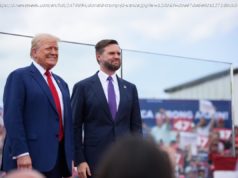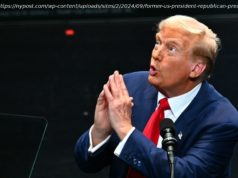US President Donald Trump’s new National Security Strategy that he unveiled on Monday abandons the rhetoric of constructive cooperation for a policy of rivalry and potential confrontation with Russia and China, analysts told Sputnik.
WASHINGTON (Sputnik) — Trump announced on Monday a new National Security Strategy (NSS) in which the United States would pursue a « great partnership » with China and Russia, but would do so « in a manner that always protects our national security. »
Retired professor and political commentator John Walsh said on Monday that the language in the new National Security Strategy was confrontational rather than friendly and cooperative, and was therefore sharply different from the warmer tones Trump had used in his conversations with the leaders of Russia and China.
« Certainly this NSS document sounds somewhat different in tone from Trump’s statements about [Chinese President] Xi Jinping and [Russian President Vladimir] Putin and it was also different in tone from Trump’s stated desire to ‘get along’ with Russia and China, » Walsh said.
« In part, this statement also reflects the pressure on Trump to back away from ‘getting along’ with Russia brought about by the [Special Counsel Robert] Mueller investigation which is really quite pathetic in terms of substance and does come down to a witch hunt as Trump has correctly termed it, » he said.
Walsh also observed that the document never mentioned any goal of working constructively with Moscow and Beijing to reduce global tensions and resolve international problems.
« This document does not appear to speak of ‘solving the problems of the world by working together with Russia and China as Trump has promised to do in the past, » he said.
In the document, Trump appeared to have abandoned his previous often-repeated aspiration to work constructively with other nations around the world in favor of a determination instead to maintain US and Western global dominion, Walsh noted.
The new NSS « does not speak of win-win situations, as far as I know… In this sense, it is par for the course for Western Empires in their 500 years of global domination. Domination and win-win [the policy of mutual cooperation and benefit] are as far apart as can be imagined, » he said.
However, the NSS did not appear determined to set the United States on a collision course with either Russia or China, Walsh advised.
« The document is… realistic in some ways: There is bound to be economic competition between the United States and China. But this need not lead to military confrontation which… was part of [former President] Barack Obama and Hillary Clinton’s ‘pivot’ to East Asia, » he said.
« The interpretation of this NSS is a very tough call… Trump cannot move too far or too fast if his intent is to move to more peaceful relations with China and Russia, » he said.
Trump’s freedom to pursue constructive relations with Russia and China would probably be blocked until he was free from the Mueller investigation seeking to prove he had colluded with the government of Russia during or before his 2016 election, Walsh remarked.
« The full outlines of a more pacific Trumpian foreign policy toward Russia and China, if… that is Trump’s intent, will not come into view until the Mueller witch hunt is terminated. It will be hard to tell what Trump will do… until the Mueller witch hunt is terminated or collapses, » he said.
Trump eventually had to face the reality that the era of Western domination of the world was coming to an end, Walsh commented.
« But whether it will end with a bang or a whimper remains to be seen, » Walsh concluded.
The Director of Independent Institute Center for Peace and Freedom Ivan Eland agreed that the new NSS document left open the question of whether future US competition with Russia and China would be peaceful and at least partially constructive or whether it would be more confrontational.
« Economic competition should not be feared, because economic transactions are ‘win-win,’ not ‘zero-sum,’ as are military and informational competition, and thus governments should stay out of them as much as possible, » Eland said.
The United States would continue to confront Russia and China in military planning and deployments and probably on cyber security issues, but he advised that both these rivalries could be peacefully managed by both sides, Eland noted.
« The Russians and Chinese are US military and cyber warfare adversaries. However, perhaps an agreement banning hacking or limiting it might be possible, » Eland said.
« If the US tacitly allowed the Russians to maintain their sphere of influence in Eastern Europe, including Ukraine and Georgia, and China in the South China Sea, the possibility of military competition would be minimized, » Eland said.
Trump frequently blasted China on the campaign trail for alleged unfair trading practices, such as artificial currency devaluation. Since becoming US president, though, Trump has softened his stance toward Beijing.






